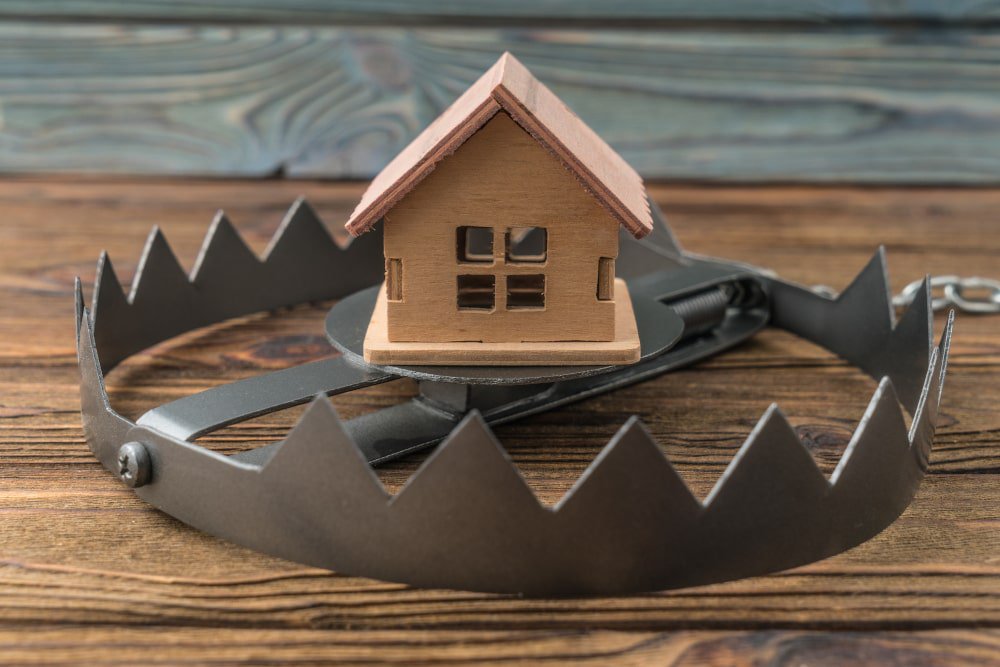Beware of Mortgage Fraud!

Purchasing a home can be a significant milestone in any Canadian’s life, and for most people, it's the largest financial transaction they will ever undertake. Unfortunately, this also makes mortgage fraud an appealing prospect for scammers — which is why you should be prepared! In this guide, we will explore the world of mortgage fraud, offering insights on how to best recognize and prevent it, along with essential tips to protect yourself from falling victim to these schemes.
Recognizing and Preventing Mortgage Fraud
Mortgage fraud comes in various forms, but the most common schemes involve either misrepresenting information on a mortgage application or manipulating property-related transactions. Understanding how mortgage frauds work is key to preventing them, and there are different types of mortgage frauds to be aware of.
Before entering into any mortgage agreement, it's very important that you verify the legitimacy of the lender. Look for licensing, accreditation, and positive reviews from reputable sources. Always choose a recognized financial institution or lender with a proven track record. In Canada, mortgage fraud jail time can be substantial, so dealing with reputable lenders is essential to avoid legal trouble.
You should also take the time to properly understand the terms of your mortgage. If something seems too good to be true, or too complicated to comprehend, it might be a sign of potential fraud. Consult a trusted attorney or broker to ensure you fully grasp the terms and conditions of your mortgage. Beware of mortgage offers that claim "no money down" or request only a minimal upfront payment. Such offers might involve hidden fees and predatory lending practices, which can lead to financial distress.
Tips to Avoid Falling Victim to Mortgage Fraud
Preventing mortgage fraud begins with vigilance and informed decision-making. Here are some crucial tips to avoid falling victim to fraudulent schemes:
Double-Check All Documents
Carefully review all mortgage-related documents, contracts, and agreements before signing them. If you don't understand any part of the paperwork, seek legal advice to protect yourself from becoming an unwitting participant in mortgage fraud.
Do Your Research
Research the property and its history, including any previous ownership and liens. Make sure there are no disputes or irregularities related to the property that could affect your mortgage. Investigating the property's background is a vital part of preventing mortgage fraud.
Guard Personal Information
Protect your personal information and financial data. Never share sensitive details with unverified sources or strangers who claim to be lenders. Legitimate lenders will have secure systems for data handling, and this precaution can help you avoid falling victim to identity-related mortgage fraud.
Be Skeptical of Unsolicited Offers
If you receive unsolicited mortgage offers through emails, phone calls, or social media, be cautious. Legitimate lenders do not typically solicit business in this manner. Be sure to report such suspicious activities to an authority who investigates mortgage fraud.
Identifying Red Flags
Recognizing red flags can help you steer clear of potential mortgage fraud. Here are some common warning signs:
Too-Good-to-Be-True Offers: Mortgage terms that seem exceptionally favorable or unrealistic might be a red flag and could be part of a fraudulent scheme.
Unverified Lenders: If a lender cannot provide verifiable credentials or refuses to share information about their business, consider it a warning sign that they may be involved in mortgage fraud.
Pressure to Act Quickly: Scammers often create a sense of urgency, pressuring you to sign documents immediately. Take your time and consult professionals to avoid unwittingly participating in mortgage fraud schemes.
Missing or Incomplete Documentation: If essential documents are missing, incomplete, or contain discrepancies, it may signal fraudulent activity. Report such discrepancies to the authorities responsible for mortgage fraud investigation.
Protect yourself by staying informed, verifying the legitimacy of lenders, and seeking professional advice when necessary. Working with a Clover Mortgage can help you avoid falling victim to fraudulent lenders by connecting you to a wide variety of options within a vast network of over sixty trusted lenders. By recognizing and preventing mortgage fraud, you can secure your financial future and enjoy the peace of mind that comes with homeownership while avoiding the financial consequences associated with mortgage fraud.
FAQ
Is mortgage fraud common in Canada?
While mortgage fraud does occur in Canada, the majority of mortgage transactions are legitimate. The Canadian government, law enforcement agencies, and financial institutions have implemented various measures to combat mortgage fraud, including mortgage fraud jail time. These include enhanced identity verification, stricter lending regulations, and increased cooperation between different stakeholders, such as lenders, real estate professionals, and law enforcement agencies.
Despite these measures, it can never hurt to be vigilant and take necessary precautions to prevent and report any suspicious activities. If you suspect mortgage fraud or have concerns about a particular transaction, it is best to contact your local authorities and financial institutions for assistance.
How do you protect yourself from mortgage fraud?
Here are several steps you can take to safeguard against potential mortgage fraud:
- Ensure that your lender is legitimate and well-established. Research their credentials, licenses, and reputation.
- Carefully review and understand the terms and conditions of your mortgage. Seek professional advice if needed to make sure you comprehend the agreement fully.
- Thoroughly review all mortgage-related documents, contracts, and agreements before signing them. If something seems unclear or suspicious, consult with a legal professional.
- Investigate the property's history, including previous ownership, liens, and any disputes. Ensure the property's value is accurately represented.
- Protect your personal information and financial data. Never share sensitive details with unverified sources or strangers who claim to be lenders.
- Beware of unsolicited mortgage offers through emails, phone calls, or social media. Legitimate lenders typically do not solicit business in this manner.
- Hire a reputable appraiser to assess the property's value objectively. This can help prevent property valuation fraud.
- Seek advice from qualified professionals, such as real estate agents, mortgage brokers, attorneys, and financial advisors, to guide you through the process and help you identify any irregularities.
How do banks detect mortgage fraud?
Banks and financial institutions have developed a number of strategies to detect mortgage fraud and protect themselves from fraudulent activities. Here are some common techniques and practices used:
- Banks thoroughly verify the documents provided by borrowers, including income statements, bank statements, tax returns, and employment information. Any inconsistencies or discrepancies may trigger further investigation.
- Lenders assess the credit history of borrowers to identify any irregularities, such as sudden changes in credit scores or multiple recent credit inquiries.
- Independent and professional property appraisals are conducted to confirm the property's value. A significant difference between the appraised value and the loan amount can be a red flag.
- Banks use identity verification methods to ensure that borrowers are who they claim to be. This includes checking identification documents and, in some cases, using biometric verification.
- Banks may verify whether the property being purchased will be the borrower's primary residence, as this can affect the terms of the loan.
- Lenders may use data analytics and algorithms to identify patterns or anomalies in loan applications and transactions. Sudden changes in behavior, such as frequent refinancing, may raise suspicion.





